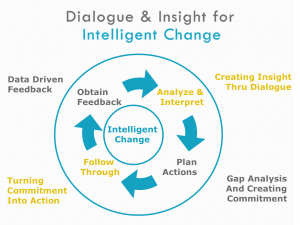When you walk in the room, who shows up for Read more →
Different Perspectives on Feedback
Posted Wednesday, August 29, 2012Allen Slade
I see performance feedback sessions as an excuse for a great conversation. Not everyone shares my perspective. One manager at Microsoft gave performance feedback by Post-It note. The day of reviews, she got into work early and stuck a note on each monitor with a review score, merit pay, bonus and stock options. Then, she took the rest of the day off. I was aghast. In my mindset, this manager had great cowardice instead of a great conversation.
As a leader, have you been surprised at someone else’s approach to feedback? Suzanne Cook-Greuter lists seven ways to respond to feedback[1]:
Opportunist. Focuses on own immediate needs and opportunities. Values self-protection. Receives feedback as an attack or threat.
Diplomat. Focuses on socially expected behavior. Values approval of others. Sees feedback as disapproval or judgment.
Expert. Focuses on expertise, procedure and efficiency. Values expertise in self and others, but takes feedback personally as an attack on own expertise. Defends, denies, and delays feedback, especially from lesser experts.
Achiever. Focuses on delivery of results. Values effectiveness, goals and success. Accepts feedback if it helps achieve personal goals and improve effectiveness.
Individualist. Focuses on self interacting with the system. Individual purpose and passion are more important than the system. Welcomes feedback as necessary for self-knowledge and to uncover hidden aspects of their own behavior.
Strategist. Focuses on linking theory and practice. Looks for dynamic systems and complex interactions. Invites feedback for self-actualization.
Magician. Focuses on interplay of awareness, thought, action and effects. Values transforming self and others. Views feedback as natural and essential for learning and change.
Opportunists, diplomats and experts all have a problem with feedback. They resist negative feedback, breaking the cycle of intelligent change.
Today’s post focuses on achievers, individualists, strategists and magicians who all share an openness to feedback. Let’s look at each in detail:
4. The achiever wants to win – accomplish the goal, launch the product, land the contract. An achiever looks for a score, a time, or an amount; in other words, feedback that defines achievement. The achiever mindset seeks success within the status quo, like Zaleznik’s “manager.” The achiever plays the feedback game to win.
5. The individualist wants personal growth. Feedback is welcomed because it triggers growth and change. The individualist can return to the mindset of an achiever, going full speed after goals. But the individualist sees self-purpose as more important than the rules of the system. The individualist challenges the status quo, like Zaleznik’s “leader.” The individualist wants to fix the feedback game to make it better.
6/7. The strategist and the magician play the feedback game at a higher level. Instead of a single loop of feedback and action planning, strategists sees interconnected loops with multiple points of contact and causality. When I play Monopoly, I see math skills for my kids to develop, political dynamics for them to perceive and opportunities for them to make SMARTer requests. (At the same time, the individualist in me wants to grow as a parent and the achiever in me wants to win!) The magician sees feedback as integral to all healthy systems, so they create feedback loops, building systems on top of systems.
Bottom line: People think about feedback differently. Know yourself. Know how the people around you react to feedback. Adjust to maximize your influence.
Know yourself. As a leader, know your own mindset in accepting feedback. Which is your typical response to feedback? When you are at your best, what is your response? Your reaction to feedback depends in part on your mental and emotional state.
When I am caught off guard by negative feedback, I tend to react as an expert – defend, deny, and delay. If caught off guard, I try to say “This seems important. Can we talk about it tomorrow?” By delaying (instead of denying or defending), I can receive feedback when I am at my best. Know your triggers for ineffective responses to feedback and work around them.
Bridge to your employees. As a leader, you need to bridge between your mindset and the mindset of your employee. Bridging may involve translation, empathy and a mixture of resolve with patience.
Leaders often give performance feedback expecting the employee to react with an achiever’s mindset. The employee, with an expert mindset, sees the leader as a lesser expert with out-of-date skills and little sense of the actual job. The leader gives achievement-oriented feedback and the expert employee defends, denies or delays. The feedback meeting goes from bad to worse, because manager and employee both believe the other is naive, wrong or worse.
Translate your feedback into your employee’s mindset. In giving feedback to an expert, call on your expertise as a manager. “You know more about your job than me, but I know how management thinks.” If your employee is a diplomat, avoid judgmental words. “Let’s help you fly under the radar in the future.”
Be empathetic. Every mindset is built on all the earlier mindsets. If you are an achiever and your employee is an expert, regress a bit. Remember how to think as an expert and go from there.
Mix resolve and patience. Stick to your guns, but give your employee time to come around. Give continuous feedback so there are no surprises.
Bridge to your boss. As a leader, you and your boss may not share the same feedback mindset. If your boss is at an earlier feedback mindset than you, use translation, empathy, resolve and patience. If your boss is at a later feedback mindset than you, translation and empathy will be tougher because you don’t grasp their mindset yet. Be patient. Resolve to listen and learn so you can grow to think about feedback like they do.
People think differently about feedback. As a leader, bridge these differences with translation, empathy, resolve and patience.

